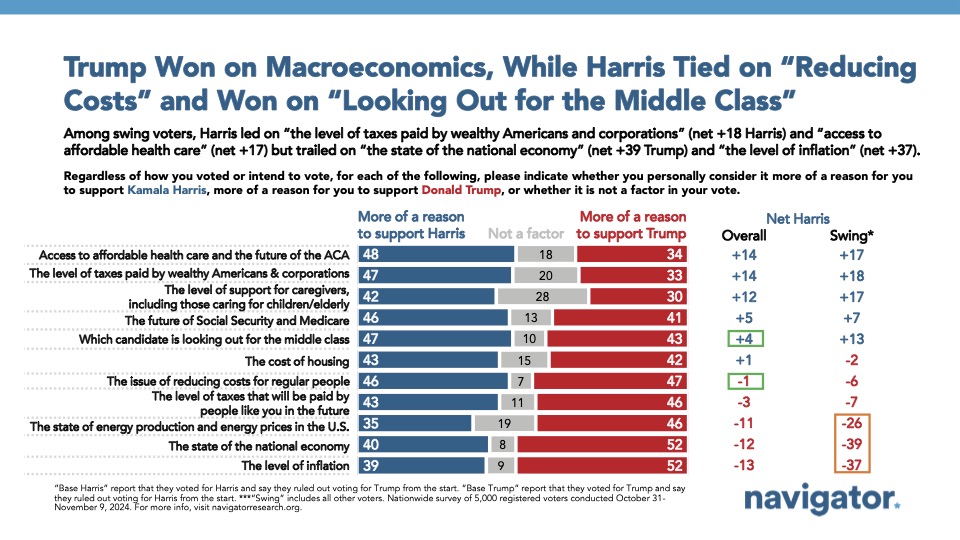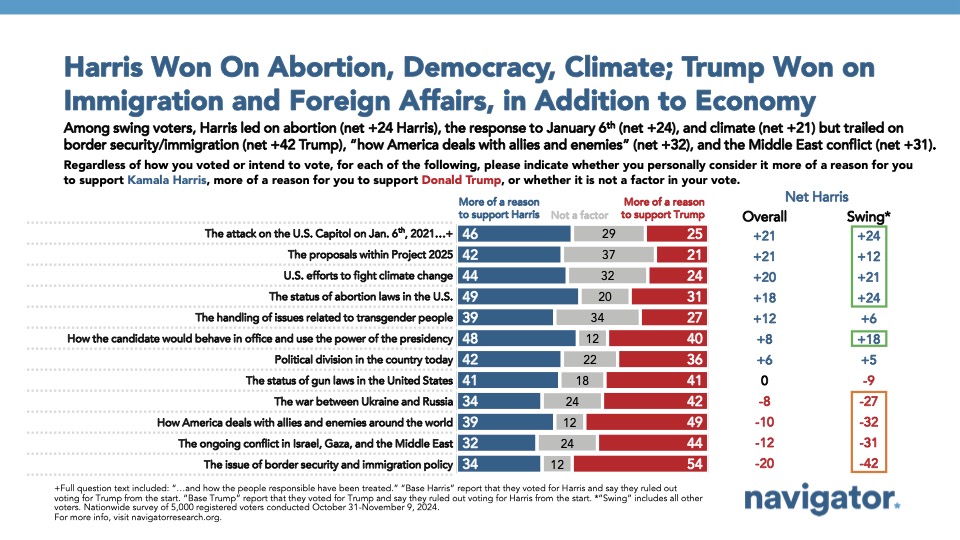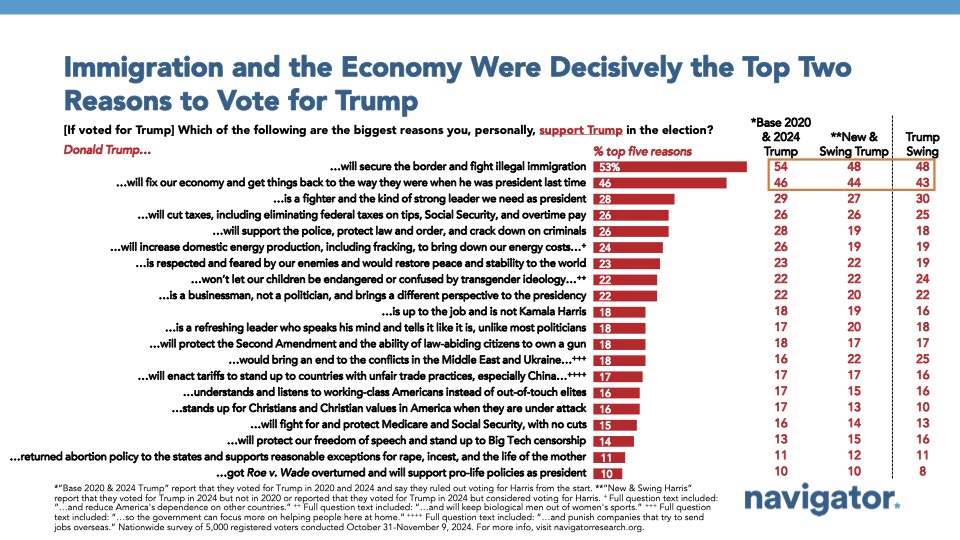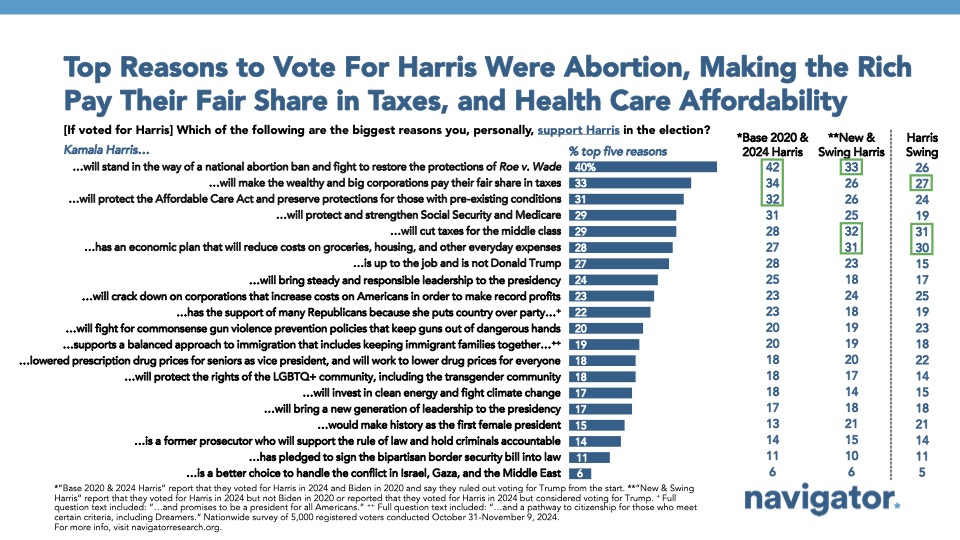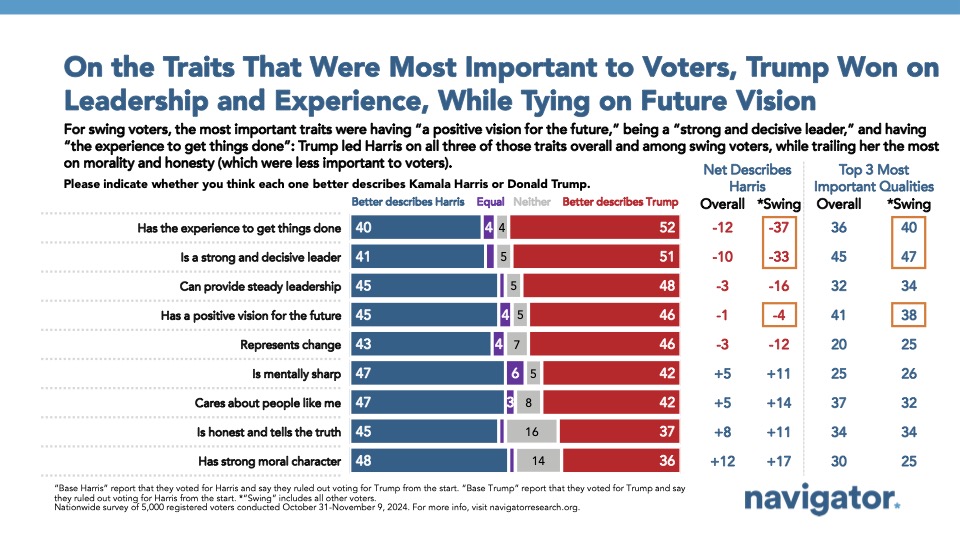Exit Poll: Reasons for Voting for Trump and Harris
Today’s Navigator A.M. is the second in a series of releases of findings from our post-election survey among 5,000 self-reported 2024 general election voters. This release focuses on the top reasons that 2024 election voters supported Donald Trump or Kamala Harris, perceptions of their characteristics as candidates for president, and what issues each candidate was seen as most focused on during the presidential election campaign.
Among 2024 voters, the state of the national economy and the level of inflation were seen as reasons to support Trump by double digits.
Trump held a 12-point advantage among the 2024 electorate on the state of the national economy (40 percent more of a reason to support Harris – 52 percent more of a reason to support Trump) and a 13-point advantage on the level of inflation (52 percent) than more of a reason to support Harris (39 percent). Among “swing voters” — those who did not rule out voting for Trump or Harris from the start of the campaign, and whom Trump won by 8 points — Trump held a 39-point advantage on the level of inflation being more of a reason to support him (23 percent more of a reason to support Harris – 62 percent more of a reason to support Trump) and a 37-point advantage on the state of the national economy being more of a reason to support him (24 percent more of a reason to support Harris – 61 percent more of a reason to support Trump).
However, while Trump held advantages on these macroeconomic dimensions, Harris held advantages on a number of other dimensions related to people’s personal economic experiences when it comes to health care, looking out for the middle class, and taxes. Harris held a 14-point lead overall on access to affordable health care and the future of the Affordable Care Act as being more a reason to support her (48 percent more of a reason to support Harris – 34 percent more of a reason to support Trump), a 14-point advantage on the level of taxes paid by wealthy Americans and corporations (47 percent more of a reason to support Harris – 33 percent more of a reason to support Trump), and a narrower 4-point advantage on which candidate is looking out for the middle class (47 percent more of a reason to support Harris – 43 percent more of a reason to support Trump).
- On the issue of reducing costs for regular people, voters were evenly split on whether it was more a reason to support Harris or Trump (46 percent more of a reason to support Harris – 47 percent more of a reason to support Trump), though Trump held a 6-point advantage on this dimension among “swing voters.”
- Harris also held double-digit advantages on a number of other non-economic issues, including U.S. efforts to fight climate change (net +20; 44 percent more of a reason to support Harris – 24 percent more of a reason to support Trump), the status of abortion laws in the United States (net +18; 49 percent more of a reason to support Harris – 31 percent more of a reason to support Trump), and “how the candidate would behave in office and use the power of the presidency” (net +8; 48 percent more of a reason to support Harris – 40 percent more of a reason to support Trump).
Trump voters said fighting illegal immigration and fixing the economy were the top reasons to support him.
Trump voters said fighting illegal immigration and fixing the economy were the top reasons to support him, while Harris voters were most likely to say that her standing in the way of a national abortion ban and making the wealthy and big corporations pay their fair share in taxes were the top reasons for supporting her. When Trump voters were asked in this survey to rate the top five reasons for supporting him in the election, a majority — 53 percent — said that he “will secure the border and fight illegal immigration” was one of their biggest reasons. This was followed closely behind by the belief he “will fix our economy and get things back to the way they were when he was president last time” (46 percent). Among Harris voters, the top three reasons to support her included that she would “stand in the way of a national abortion ban and fight to restore the protections of Roe v. Wade” (40 percent), that she would “make the wealthy and big corporations pay their fair share in taxes” (33 percent), and that she would “protect the Affordable Care Act and preserve protections for those with pre-existing conditions” (31 percent).
Being a strong, decisive leader and having a positive vision for the future were the most important personal qualities for voters.
The most important personal characteristics about the candidates for president were having the experience to get things done and having a positive vision for the future; Trump was seen more as being a strong and decisive leader by 10 points while the candidates were tied on having a positive vision for the future. 45 percent of voters ranked being a strong and decisive leader as being most important to their vote, followed by 41 percent who said having a positive vision for the future was most important, and 37 percent said the same about their preferred candidate “caring for people like me.” A majority of voters said that being a strong and decisive leader better described Trump by 10 points (41 percent Harris – 51 percent Trump), while the candidates were evenly split on who had a positive vision for the future (45 percent Harris – 46 percent Trump). Harris held a 5-point advantage on “caring about people like me” (47 percent Harris – 42 percent Trump).

